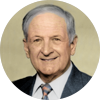Whenever you get a group of doctors together at a meeting, about 20 percent or so dominate the discussions; the rest do most of the listening. The silent listeners tend to be followers and supporters of the more vocal group. This is a familiar scenario that we can all relate to.
Public speaking is a frightening experience to many. Some people are "scared to death" to speak in public. That reminds me of a story. In Roman times, a Christian was thrown to the lions. Every time the lion attacked the Christian and was ready to devour him, the Christian would whisper into the lion's ear and it would cower. The Romans sent a centurion into the arena to find out what the Christian was saying to the lion. The centurion reported back that the Christian told the lion that he was expected to make an after dinner speech.
Fear of public speaking is a powerful deterrent. There is a fear of saying the worst thing and embarrassing oneself. There is the fear of not giving a competent answer to a critical question. There is fear of freezing up and being humiliated. There can even be fear based on not having full confidence in the chiropractic profession as deserving better consideration than it gets. At least these are healthy fears indicating a sincere desire to do the best possible job.
We want public speakers who have such fears and respect for wanting to do the best job possible. We certainly don't want "Rambo"-like characters who shoot from the hip and recklessly go to the media without these concerns. Anyone going on a talk show will feel an adrenaline rush and tension about performing, but you use this nervous energy toward giving a better performance.
The answer to overcoming these fears is to be properly prepared. Going in ill-prepared could prove disastrous. It can be shown within the friendly confines of a chiropractic workshop or round table gathering how an adversary simply does not have a prayer against a well-trained chiropractic speaker. I have demonstrated this time and again in workshops by challenging the doctors to attack chiropractic with all the fury they could muster and watch what answers could be used. They have never been able to embarrass chiropractic because of the solid facts we have to refute any criticisms or charges. Of course, it takes practice, but with this realization comes confidence and a willingness to speak publicly.
There is a tendency to let the quiet doctors sit back and simply be supporters of the vocal ones. This is where we often make our biggest mistake. Why not take some of these quiet doctors and motivate them to become involved in a speaker's bureau program connected with your state association? Too often they are overlooked when, if properly approached and motivated to get involved, they could become the greatest force we have in communicating chiropractic. There is somehow a mistaken belief that if we pay our dues that some invisible force will come along and do all of our communicating. It doesn't work that way. It really has to begin at the grassroot's level, starting with an assertive recruiting program to get as many quiet doctors involved. Therein lies our answer. They can be sleeping giants.
Not only would the quiet doctors be helping their profession gain its rightful place in health care, but their own self-image would grow and would be reflected in the manner in which they communicate with their patients. Their practices would grow individually, not only because of their own mental attitude which could be seen by their patients, but because people would hear or see them on radio or television talk shows and would want specifically to see that doctor. Everyone grows in the process.
This entire movement toward training speakers should be supported by every state association: the national association should encourage the states to move in this direction. It is the only economically feasible approach. We could see hundreds of doctors converging on literally every radio, TV, newspaper, and legislator in the land. A properly communicated message coming from all of these sources would have a profound impact on chiropractic. I would be happy to lend my assistance to any state association interested in initiating this program.
Chester Wilk, DC
Chicago, Illinois
Click here for previous articles by Chester Wilk, DC.





